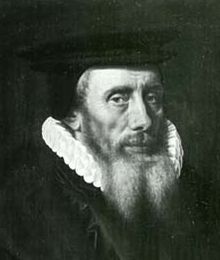Johannes Goropius Becanus
Johannes Goropius Becanus , the Latinized form of his original name Jan van Gorp van der Beke , French Jean Becan , (born June 23, 1519 in Gorp , † June 28, 1572 in Maastricht ) was a Dutch doctor, linguist and humanist.
Van Gorp indicates his place of birth, as does van der Beke (near Gorp, today's Hilvarenbeek ).
Life
He studied in Leuven and was the personal physician of the sisters of Emperor Charles V , Maria of Hungary and Eleanor of Castile , in Brussels. He turned down an offer to become Philip II's personal physician and settled in Antwerp as a city doctor in 1554 , where he devoted himself primarily to humanistic studies. He had traveled widely (Italy, France, Great Britain, Germany, Spain). He lived his last years in Liège. He fell ill in Maastricht, where the Duke of Medina appointed him as a doctor. He is buried in the Franciscan Church in Maastricht.
He was considered a great scholar who spoke many languages and wrote Latin poetry, but also an enthusiast who was quickly carried away by his own ideas.
He is best known for his book Origines Antwerpianae from 1569 (Antwerp: Plantin), mainly about local history and anecdotes from Antwerp, an extensive work of over 1000 pages.
He also tried to prove that the original language of mankind (as it was spoken in Paradise) was Brabant because of the many short words. To prove it, he tried to derive Latin and Hebrew words from Brabantian. So he derived Adam from Hath-Dam (dam against hatred) and Eve from Eed-Vat (the barrel of the oath from which man emerged or the word was born). After him, paradise was in Flanders. Egyptian hieroglyphs were also written after him in Brabantian. When this became known in the collected works published in 1580 (Opera Joannis Goropii Becani, published by Plantin in Antwerp), it was posthumously mainly the target of ridicule: Gottfried Wilhelm Leibniz referred to such etymological absurdities as goropisms . Joseph Scaliger announced that he had never read any major nonsense. Even Hugo Grotius (the self-linguistic theories pursued) and Justus Lipsius rejected his theories, but its localization of paradise in Flanders lived on in the popular memory.
Contributions to geology
As the geological historian François Ellenberger (1915-2000) found, he is also a pioneer in geology with his book Origines Antwerpianae . The book shows that he himself looked for fossils in the Alps and found shell fossils on mountain peaks, as well as in the Paris basin (quarries in the underground of Paris) and in his closer home country Belgium (Ardennes, mussel beds when drilling wells in the underground of Antwerp) . This sets him apart from other early scholars who studied fossils but did not collect them or study them on site. He mentions fossil shark teeth that are often found near Antwerp, including considerably larger ones than known in recent species (from megalodons from the Miocene ). He also mentions extinct forms of life, in the form of pyritized ammonites, which he saw in a collection in England, and finds of "giants" (teeth of fossil elephants) in a section entitled Gigantomachia . He opposes the views of Jean Chaussanion and others (1580) that they are leftovers from giants. His opinion wavers about the explanation of the origin of fossils. On the one hand, he clearly sees the kinship with today's marine animals, on the other hand, he is reluctant to assume that his homeland Belgium was flooded several times in the past (in his opinion, Bible passages prove that God strictly separated land and sea, apart from the Flood) and he sees them Finds of shell fossils on mountain peaks as an argument against such explanations. He knows the ancient authors well and explains their arguments in detail, but then decides in favor of a theory of the secondary production of fossils by nature's inherent formative forces, similar to that of Aristotle.
The dispute over the origin of fossils was a major theme and central point in early geology between supporters of an ancient theory of the possibility of spontaneous generation and early Neptunist precursors, who (like Nicolaus Steno ) held the modern view that they were leftovers from living things.
literature
- Alberdingk Thijm: Becanus Goropius, Johann . In: Allgemeine Deutsche Biographie (ADB). Volume 2, Duncker & Humblot, Leipzig 1875, p. 199.
- BW Duijvestijn: Johannes Goropius Becanus, in: Brabantse biografieën I, Amsterdam 1992.
- Rob Naborn: Becanus' etymological methods, in Voortgang, Jaarboek voor de Neerlandistiek 15 (1995), 79-86
- Rob Naborn: Etymologies in Joannes Goropius Becanus' Hermathena, Master's Thesis, University of Kansas, 1989.
- Eddy Frederickx, Toon van Hal: Johannes Goropius Becanus (1519-1573). Brabants arts en taalfanaat, Hilversum, 2015
- Toon van Hal: Moedertalen en taalmoeders. Het vroegmoderne taalvergelijkende onderzoek in de Lage Landen, Brussel, 2010, 77-140.
- André Blavier: Les fous littéraires, Paris 1982.
- François Ellenberger: Jan van Grop (Goropius Becanus), 1518-1572: un pionnier méconnu de l'étude des fossiles au XVIème siècle, Comité français d´Histoire de la Géologie, 1987, online
Web links
| personal data | |
|---|---|
| SURNAME | Becanus, Johannes Goropius |
| ALTERNATIVE NAMES | Van Gorp van der Beke, Jan; Becan, Jean |
| BRIEF DESCRIPTION | Belgian doctor, linguist and humanist |
| DATE OF BIRTH | June 23, 1519 |
| PLACE OF BIRTH | Gorp |
| DATE OF DEATH | June 28, 1572 |
| Place of death | Maastricht |
